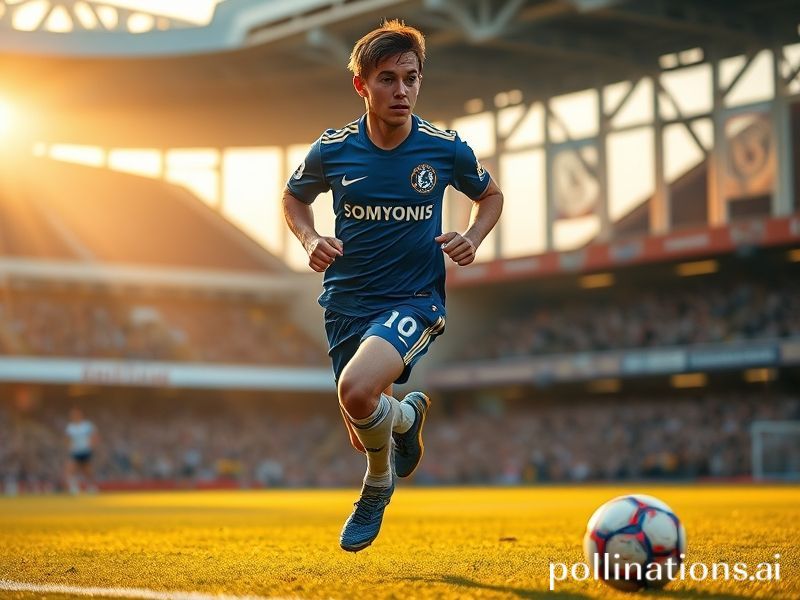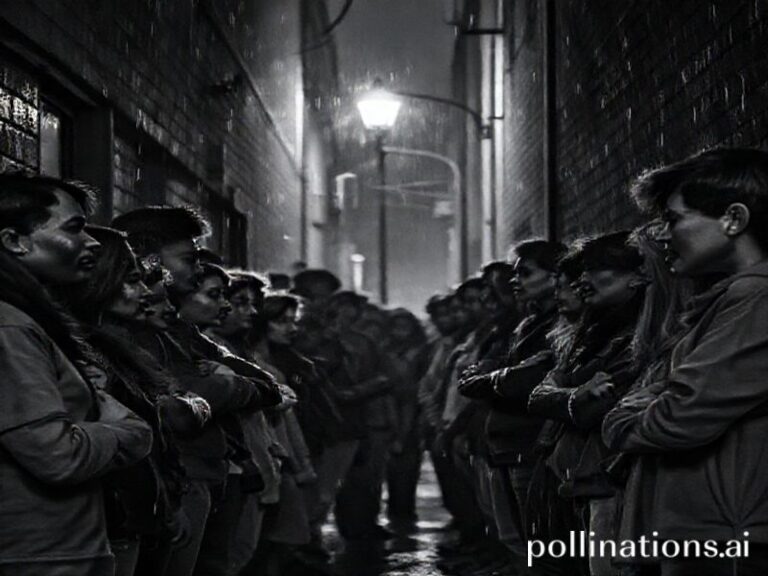Cole Palmer: The Soft-Power Prodigy Quietly Redrawing the World’s Football Map
Cole Palmer: The Quiet English Kid Quietly Reshaping Global Football’s Hierarchy
By Dave’s Foreign Desk, somewhere between a damp Tuesday in Manchester and a sun-baked Champions League night
LONDON — The world’s supply chains are sputtering, glaciers are auditioning for puddles, and democracy is locked in a never-ending group chat with itself, yet the planet’s most reliable export remains the English attacking midfielder with cheekbones sharp enough to slice prosciutto. Enter Cole Palmer: 21, Croydon-bred, now moonlighting as Manchester City’s resident chaos agent and, if the geopolitics of football are any guide, a quiet weapon in the soft-power cold war between petro-states, venture-capital sheikhs, and whichever oligarch hasn’t had his yacht repossessed this week.
Palmer’s emergence matters far beyond the Etihad’s carbon-neutral halo. In an era when nation-states treat Champions League coefficients like credit ratings, every slaloming run he uncorks against Borussia Dortmund is another notch on Brand Britain’s tattered belt. The Home Office won’t say it, but Palmer’s left foot does more for the UK’s international image than a dozen royal weddings and a lifetime supply of James Bond reboots. Even the French have stopped rolling their eyes—temporarily.
On the face of it, Palmer is the classic post-Brexit fairy tale: local academy lad graduates to first-team payroll just large enough to keep the agents, lawyers, and cryptocurrency sponsors from staging a coup. Yet beneath that boy-next-door veneer lurks a multinational backstory. His Ivorian heritage means Abidjan cafés debate whether he’ll one day flip to Les Éléphants, thereby adding another layer to the perpetual talent tug-of-war between former colonial powers and their diasporic offspring. If he does, expect a Twitter meltdown that makes Suez look like a polite misunderstanding.
Meanwhile, in the Gulf, recruitment analysts for Saudi Pro League HR departments—yes, they exist, and yes, they have better data than MI6—have already bookmarked Palmer’s progressive-pass radar charts beside drone footage of their next target stadium. The league’s pitch is simple: come sunbathe in Riyadh, pocket a salary that could bail out a small European bank, and pretend the 42-degree heat is “dry.” Palmer hasn’t bitten yet, but the offer hovers like a vulture over a wounded wildebeest documentary.
Across the Atlantic, Major League Soccer executives—those tireless optimists who believe Americans will one day care about a league table that isn’t printed on green felt—watch Palmer highlights with the hunger of a hedge-fund intern scanning for the next meme stock. If NYCFC can’t lure the real thing, they’ll settle for his digital twin in FIFA 27, monetized via NFTs and a commemorative avocado toast.
All of which is to say Palmer has become a low-key geopolitical asset wrapped in shin pads. Every dazzling cameo reverberates through currency markets: shirt sales in Jakarta spike, betting apps in Lagos recalibrate odds, and somewhere in Beijing a counterfeit kit factory retools the assembly line before you can say “intellectual property theft.” The kid himself remains diplomatically mute, offering post-match interviews so bland they could be press releases from the Swiss foreign ministry. In an age of influencer confessionals, that silence is almost radical—like finding an unplugged toaster in a Tesla showroom.
Of course, darker ironies abound. Palmer’s meteoric rise coincides with English football’s moral gymnastics over blood-money ownership, human-rights sponsorships, and a carbon footprint visible from the ISS. The same pundits who once lectured us on “values” now drool over a State Fund’s quarterly statement because it might fund another inverted winger. Somewhere, George Orwell is updating Animal Farm to include a chapter on VAR.
Yet for all the cynicism, there is something absurdly hopeful in Palmer’s trajectory: proof that a kid from the London suburbs can still hack the global algorithm without first going viral on TikTok eating ghost-pepper wings. It’s a small, defiant miracle—like finding a single unbroken biscuit at the bottom of the tin—reminding us that talent, that most inconvenient of currencies, occasionally trumps capital, connections, and the entire circus of late-capitalist sport.
So watch closely when Palmer next ghosts past some overpriced Serie A full-back. Somewhere, a futures trader in Singapore will twitch, a sheikh will update his spreadsheet, and a father in Lagos will whisper to his son, “See? That could be you.” And for one fleeting moment, the world’s centrifugal chaos pauses, united in collective wonder at a 21-year-old who still looks like he should be queuing for a bus pass. Then the whistle blows, the stock tickers resume their manic dance, and we all remember that football, like everything else, is just another beautifully rigged game.







